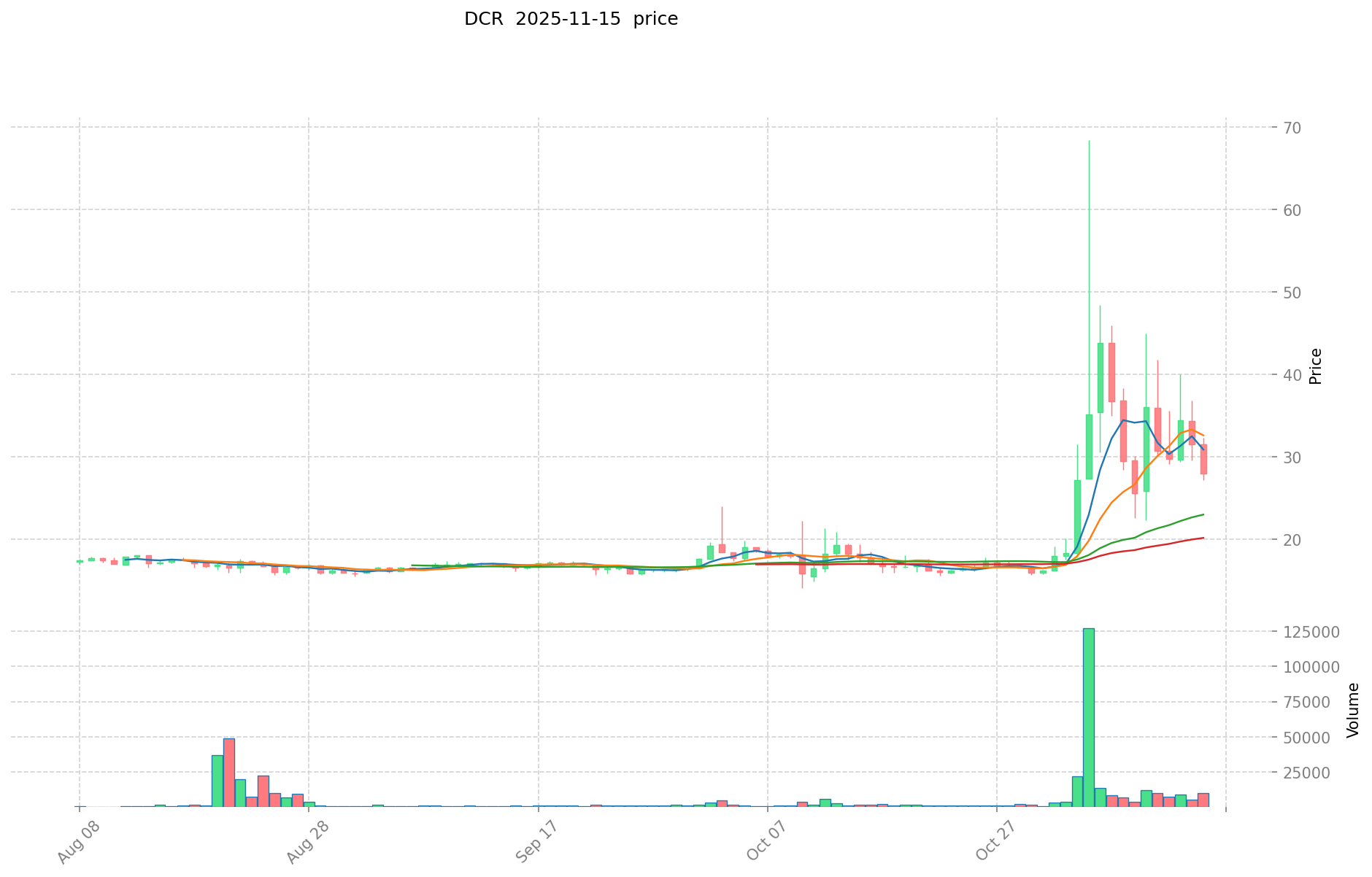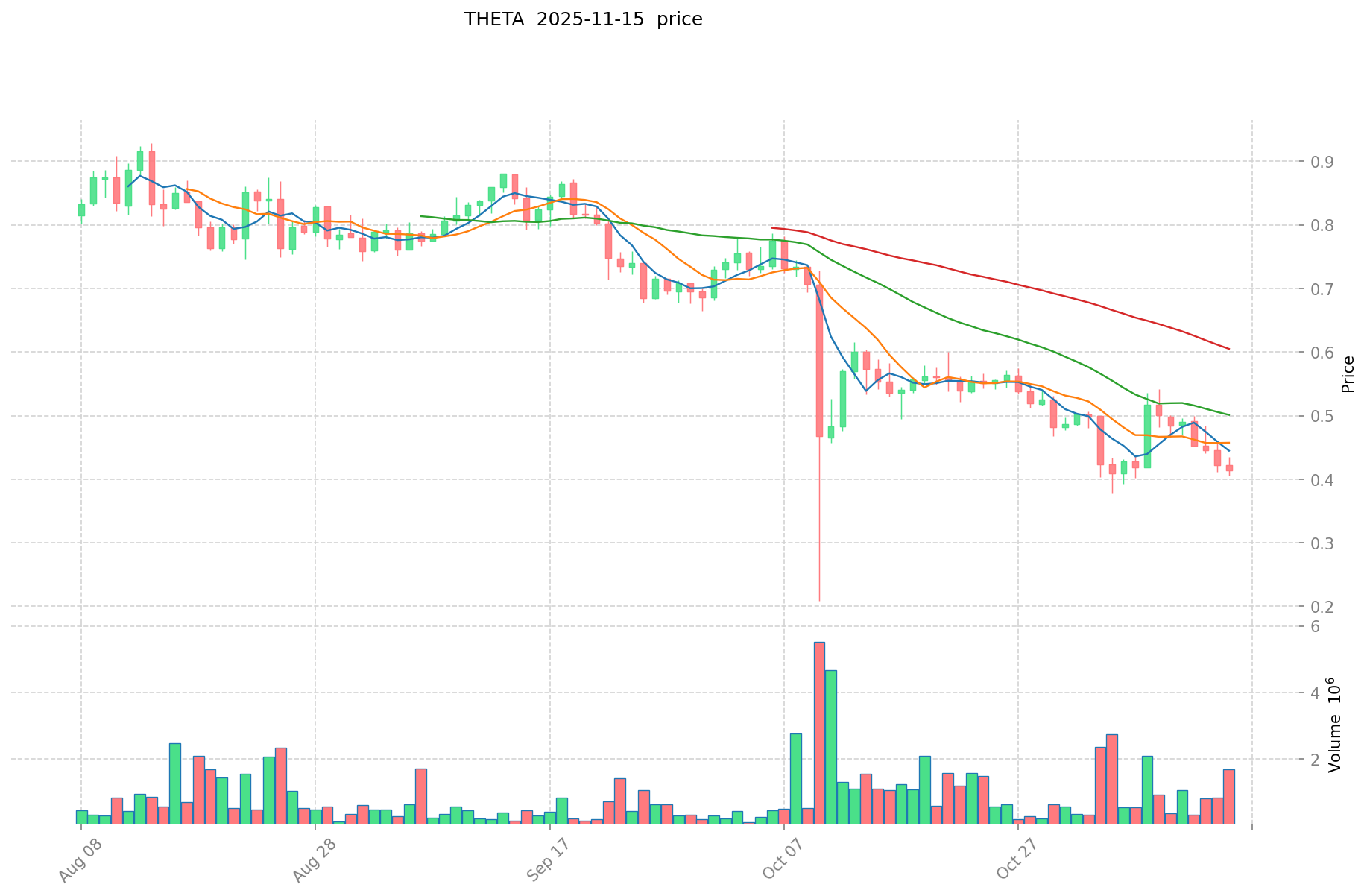DCR vs THETA: Comparing Two Blockchain Projects Revolutionizing Content Delivery
Introduction: DCR vs THETA Investment Comparison
In the cryptocurrency market, the comparison between Decred (DCR) and Theta (THETA) has always been an unavoidable topic for investors. The two not only show significant differences in market cap ranking, application scenarios, and price performance but also represent different positioning in the crypto asset space.
Decred (DCR): Since its launch in 2016, it has gained market recognition for its focus on community governance and sustainable funding.
Theta (THETA): Introduced in 2017, it has been hailed as a decentralized video streaming platform, aiming to revolutionize content delivery networks.
This article will comprehensively analyze the investment value comparison between DCR and THETA, focusing on historical price trends, supply mechanisms, institutional adoption, technological ecosystems, and future predictions, attempting to answer the question most concerning to investors:
"Which is the better buy right now?"
I. Price History Comparison and Current Market Status
DCR (Coin A) and THETA (Coin B) Historical Price Trends
- 2021: DCR reached its all-time high of $247.35 on April 17, 2021.
- 2021: THETA hit its record high of $15.72 on April 16, 2021.
- Comparative analysis: Since their respective peaks in 2021, both DCR and THETA have experienced significant declines. DCR dropped from $247.35 to a current price of $31.465, while THETA fell from $15.72 to $0.425.
Current Market Situation (2025-11-15)
- DCR current price: $31.465
- THETA current price: $0.425
- 24-hour trading volume: DCR $297,745.45 vs THETA $655,122.19
- Market Sentiment Index (Fear & Greed Index): 10 (Extreme Fear)
Click to view real-time prices:
- Check DCR current price Market Price
- Check THETA current price Market Price


II. Core Factors Affecting DCR vs THETA Investment Value
Supply Mechanism Comparison (Tokenomics)
- DCR: Fixed maximum supply of 21 million coins with approximately 14.8 million currently in circulation. Uses a hybrid Proof-of-Work and Proof-of-Stake consensus mechanism.
- THETA: Total supply capped at 1 billion THETA tokens, with around 1 billion already in circulation. Also utilizes TFUEL as a separate operational token with 5.3 billion circulating.
- 📌 Historical Pattern: DCR's limited supply model creates scarcity similar to Bitcoin, while THETA's dual-token system separates governance from operational functions.
Institutional Adoption and Market Applications
- Institutional Holdings: THETA has gained more institutional attention through partnerships with major media companies like Samsung, Sony, and Google.
- Enterprise Adoption: THETA's video delivery network has been implemented by companies like Samsung and Sony, while DCR focuses more on governance and payment solutions.
- Regulatory Attitudes: Both projects have maintained relatively neutral regulatory positions, though THETA's focus on content delivery may face fewer regulatory hurdles than DCR's payment-focused approach.
Technical Development and Ecosystem Building
- DCR Technical Upgrades: Focused on governance improvements, privacy features, and decentralized exchange capabilities through its Decred DEX.
- THETA Technical Development: Developing decentralized video infrastructure, NFT marketplace, and edge computing capabilities for content delivery.
- Ecosystem Comparison: THETA has stronger integration with entertainment and media industries, while DCR focuses on financial sovereignty and governance applications.
Macroeconomic and Market Cycles
- Inflation Performance: DCR's fixed supply model may provide better theoretical inflation protection, similar to Bitcoin's store of value proposition.
- Monetary Policy Impact: Both tokens show sensitivity to broader crypto market conditions, which are increasingly correlated with traditional finance responses to interest rate changes.
- Geopolitical Factors: DCR's focus on financial sovereignty may benefit from global monetary instability, while THETA's value is more tied to global entertainment industry growth and digital content consumption trends.
III. 2025-2030 Price Prediction: DCR vs THETA
Short-term Prediction (2025)
- DCR: Conservative $22.41 - $31.57 | Optimistic $31.57 - $38.83
- THETA: Conservative $0.37 - $0.42 | Optimistic $0.42 - $0.45
Mid-term Prediction (2027)
- DCR may enter a growth phase, with expected prices ranging from $25.55 to $51.53
- THETA may enter a growth phase, with expected prices ranging from $0.44 to $0.76
- Key drivers: Institutional capital inflow, ETF, ecosystem development
Long-term Prediction (2030)
- DCR: Base scenario $44.04 - $67.76 | Optimistic scenario $67.76 - $78.60
- THETA: Base scenario $0.61 - $0.84 | Optimistic scenario $0.84 - $1.24
Disclaimer: This information is for educational purposes only and should not be considered as financial advice. Cryptocurrency markets are highly volatile and unpredictable. Always conduct your own research before making any investment decisions.
DCR:
| 年份 | 预测最高价 | 预测平均价格 | 预测最低价 | 涨跌幅 |
|---|---|---|---|---|
| 2025 | 38.82864 | 31.568 | 22.41328 | 1 |
| 2026 | 49.9816144 | 35.19832 | 30.6225384 | 12 |
| 2027 | 51.533860312 | 42.5899672 | 25.55398032 | 36 |
| 2028 | 67.29853667108 | 47.061913756 | 35.296435317 | 50 |
| 2029 | 78.3369085425498 | 57.18022521354 | 54.8930162049984 | 82 |
| 2030 | 78.599937578532084 | 67.7585668780449 | 44.043068470729185 | 116 |
THETA:
| 年份 | 预测最高价 | 预测平均价格 | 预测最低价 | 涨跌幅 |
|---|---|---|---|---|
| 2025 | 0.446145 | 0.4249 | 0.365414 | 0 |
| 2026 | 0.640218075 | 0.4355225 | 0.387615025 | 2 |
| 2027 | 0.758397105375 | 0.5378702875 | 0.44105363575 | 26 |
| 2028 | 0.952756533763125 | 0.6481336964375 | 0.466656261435 | 52 |
| 2029 | 0.888494077761346 | 0.800445115100312 | 0.728405054741284 | 88 |
| 2030 | 1.241370306753319 | 0.844469596430829 | 0.608018109430197 | 98 |
IV. Investment Strategy Comparison: DCR vs THETA
Long-term vs Short-term Investment Strategies
- DCR: Suitable for investors focused on governance mechanisms and store of value properties
- THETA: Suitable for investors interested in content delivery networks and media industry disruption
Risk Management and Asset Allocation
- Conservative investors: DCR: 30% vs THETA: 70%
- Aggressive investors: DCR: 60% vs THETA: 40%
- Hedging tools: Stablecoin allocation, options, cross-currency portfolios
V. Potential Risk Comparison
Market Risk
- DCR: Volatility due to lower trading volume and market cap
- THETA: Dependency on adoption rates in the video streaming industry
Technical Risk
- DCR: Scalability, network stability
- THETA: Network congestion during peak usage, potential vulnerabilities in smart contracts
Regulatory Risk
- Global regulatory policies may impact DCR more due to its focus on financial transactions, while THETA may face content-related regulations
VI. Conclusion: Which Is the Better Buy?
📌 Investment Value Summary:
- DCR advantages: Strong governance model, fixed supply, potential store of value
- THETA advantages: Practical use case in video streaming, partnerships with major tech companies
✅ Investment Advice:
- Novice investors: Consider a balanced approach with a slight preference for THETA due to its more established use case
- Experienced investors: Explore DCR for its governance features and potential long-term value proposition
- Institutional investors: Evaluate THETA for its industry partnerships and DCR for its unique consensus mechanism
⚠️ Risk Warning: The cryptocurrency market is highly volatile, and this article does not constitute investment advice. None
VII. FAQ
Q1: What are the key differences between DCR and THETA? A: DCR focuses on community governance and sustainable funding, while THETA is a decentralized video streaming platform. DCR has a fixed maximum supply of 21 million coins, whereas THETA has a total supply of 1 billion tokens. DCR uses a hybrid Proof-of-Work and Proof-of-Stake consensus mechanism, while THETA utilizes a dual-token system with TFUEL for operations.
Q2: Which coin has performed better historically? A: Both DCR and THETA reached their all-time highs in April 2021, with DCR peaking at $247.35 and THETA at $15.72. Since then, both have experienced significant declines, with DCR currently trading at $31.465 and THETA at $0.425 as of November 15, 2025.
Q3: How do institutional adoption and market applications compare between DCR and THETA? A: THETA has gained more institutional attention through partnerships with major media companies like Samsung, Sony, and Google. Its video delivery network has been implemented by several enterprises. DCR, on the other hand, focuses more on governance and payment solutions, with less mainstream institutional adoption.
Q4: What are the long-term price predictions for DCR and THETA? A: By 2030, DCR is predicted to reach between $44.04 and $78.60 in base and optimistic scenarios respectively. THETA is expected to be between $0.61 and $1.24 in the same timeframe. These predictions are based on current market trends and should be taken as estimates, not guarantees.
Q5: How do the investment strategies differ for DCR and THETA? A: DCR is suitable for investors focused on governance mechanisms and store of value properties, while THETA is more appropriate for those interested in content delivery networks and media industry disruption. Conservative investors might allocate 30% to DCR and 70% to THETA, while aggressive investors might do the opposite.
Q6: What are the main risks associated with investing in DCR and THETA? A: DCR faces risks related to volatility due to lower trading volume and market cap, as well as potential scalability issues. THETA's risks include dependency on adoption rates in the video streaming industry and potential network congestion during peak usage. Both face regulatory risks, with DCR potentially more impacted due to its focus on financial transactions.
Q7: Which coin is considered a better buy for different types of investors? A: Novice investors might prefer a balanced approach with a slight preference for THETA due to its more established use case. Experienced investors could explore DCR for its governance features and potential long-term value proposition. Institutional investors may evaluate THETA for its industry partnerships and DCR for its unique consensus mechanism. However, all investors should conduct thorough research and consider their risk tolerance before investing.
Share
Content